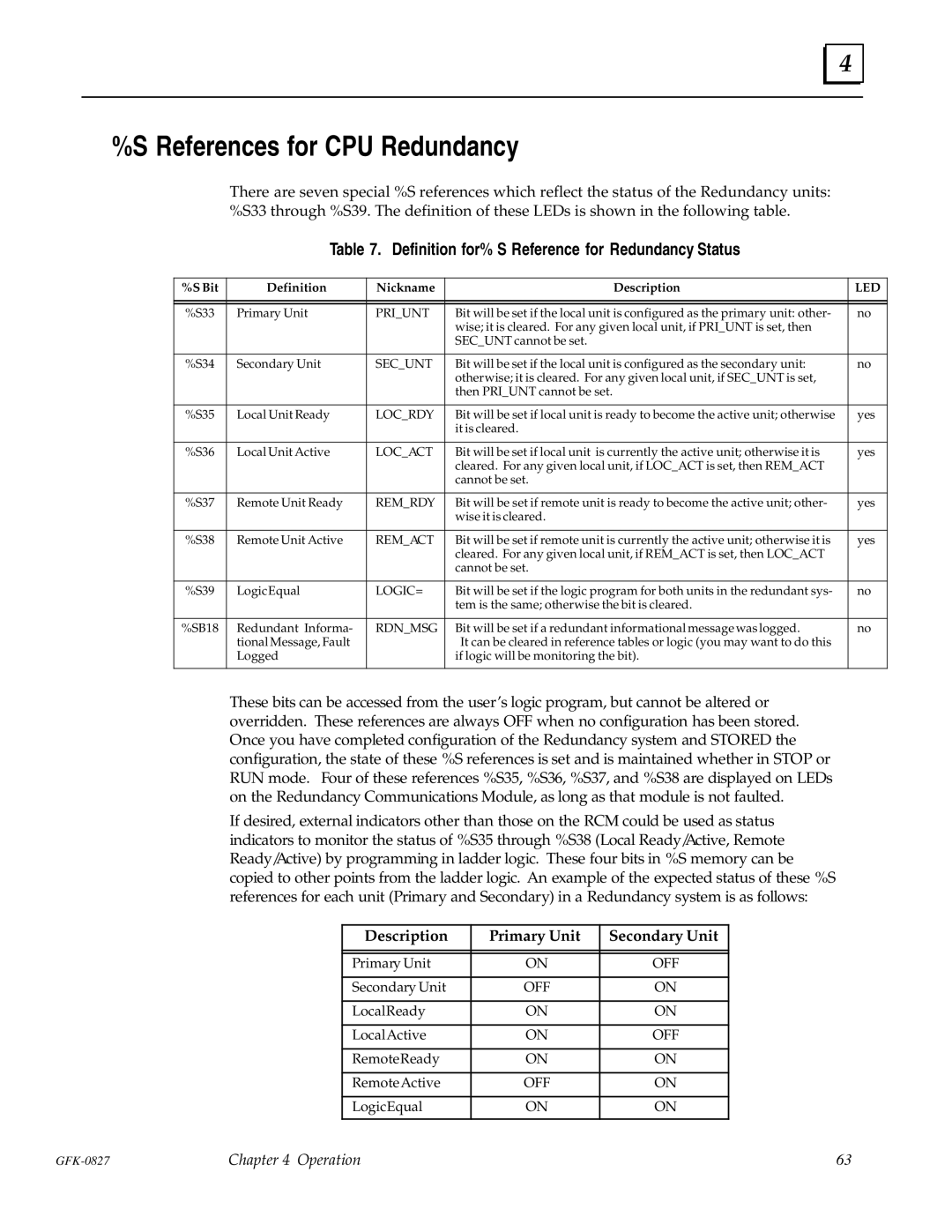
4 |
%S References for CPU Redundancy
There are seven special %S references which reflect the status of the Redundancy units: %S33 through %S39. The definition of these LEDs is shown in the following table.
Table 7. Definition for% S Reference for Redundancy Status
%S Bit | Definition | Nickname | Description | LED |
|
|
|
|
|
|
|
|
|
|
%S33 | Primary Unit | PRI_UNT | Bit will be set if the local unit is configured as the primary unit: other- | no |
|
|
| wise; it is cleared. For any given local unit, if PRI_UNT is set, then |
|
|
|
| SEC_UNT cannot be set. |
|
|
|
|
|
|
%S34 | Secondary Unit | SEC_UNT | Bit will be set if the local unit is configured as the secondary unit: | no |
|
|
| otherwise; it is cleared. For any given local unit, if SEC_UNT is set, |
|
|
|
| then PRI_UNT cannot be set. |
|
|
|
|
|
|
%S35 | Local Unit Ready | LOC_RDY | Bit will be set if local unit is ready to become the active unit; otherwise | yes |
|
|
| it is cleared. |
|
|
|
|
|
|
%S36 | Local Unit Active | LOC_ACT | Bit will be set if local unit is currently the active unit; otherwise it is | yes |
|
|
| cleared. For any given local unit, if LOC_ACT is set, then REM_ACT |
|
|
|
| cannot be set. |
|
|
|
|
|
|
%S37 | Remote Unit Ready | REM_RDY | Bit will be set if remote unit is ready to become the active unit; other- | yes |
|
|
| wise it is cleared. |
|
|
|
|
|
|
%S38 | Remote Unit Active | REM_ACT | Bit will be set if remote unit is currently the active unit; otherwise it is | yes |
|
|
| cleared. For any given local unit, if REM_ACT is set, then LOC_ACT |
|
|
|
| cannot be set. |
|
|
|
|
|
|
%S39 | LogicEqual | LOGIC= | Bit will be set if the logic program for both units in the redundant sys- | no |
|
|
| tem is the same; otherwise the bit is cleared. |
|
|
|
|
|
|
%SB18 | Redundant Informa- | RDN_MSG | Bit will be set if a redundant informational message was logged. | no |
| tional Message, Fault |
| It can be cleared in reference tables or logic (you may want to do this |
|
| Logged |
| if logic will be monitoring the bit). |
|
|
|
|
|
|
These bits can be accessed from the user's logic program, but cannot be altered or overridden. These references are always OFF when no configuration has been stored. Once you have completed configuration of the Redundancy system and STORED the configuration, the state of these %S references is set and is maintained whether in STOP or RUN mode. Four of these references %S35, %S36, %S37, and %S38 are displayed on LEDs on the Redundancy Communications Module, as long as that module is not faulted.
If desired, external indicators other than those on the RCM could be used as status indicators to monitor the status of %S35 through %S38 (Local Ready/Active, Remote Ready/Active) by programming in ladder logic. These four bits in %S memory can be copied to other points from the ladder logic. An example of the expected status of these %S references for each unit (Primary and Secondary) in a Redundancy system is as follows:
|
| Description | Primary Unit | Secondary Unit |
|
|
|
|
|
|
|
|
|
|
|
|
|
|
| Primary Unit | ON | OFF |
|
|
|
|
|
|
|
|
| Secondary Unit | OFF | ON |
|
|
|
|
|
|
|
|
| LocalReady | ON | ON |
|
|
|
|
|
|
|
|
| LocalActive | ON | OFF |
|
|
|
|
|
|
|
|
| RemoteReady | ON | ON |
|
|
|
|
|
|
|
|
| RemoteActive | OFF | ON |
|
|
|
|
|
|
|
|
| LogicEqual | ON | ON |
|
|
|
|
|
|
|
Chapter 4 Operation |
| 63 | |||
